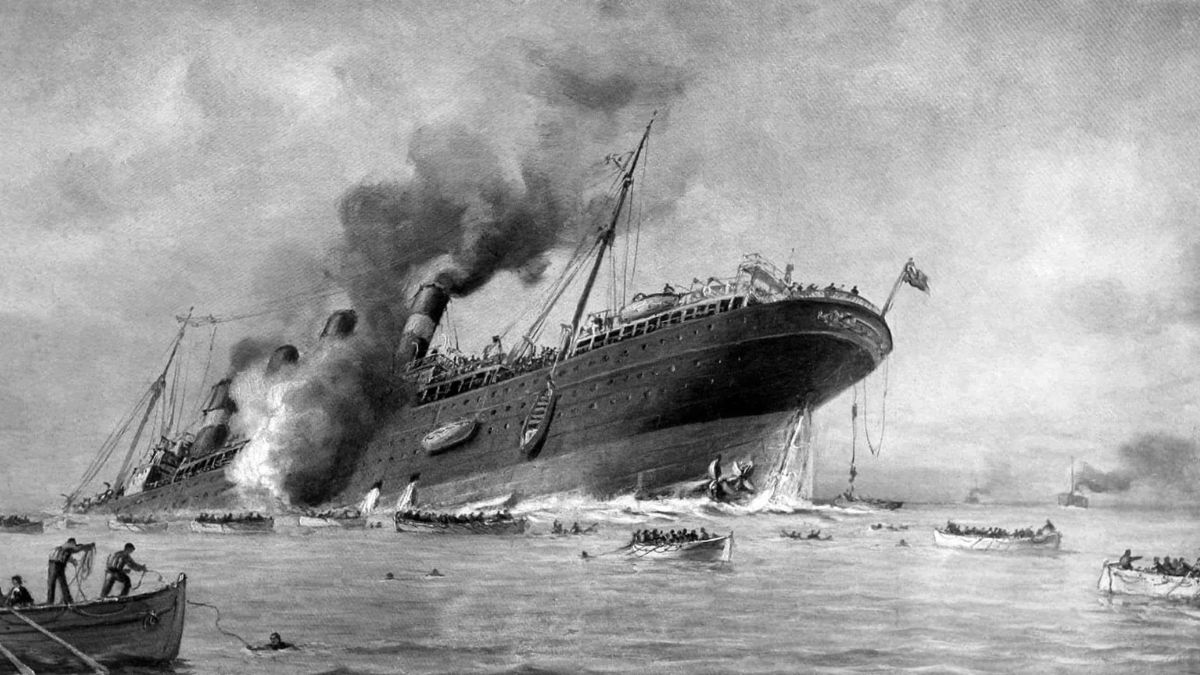The sinking of the British ocean liner RMS Lusitania is considered to be a turning point in World War I. It was after this incident on May 7, 1915, that the United States, which had maintained neutrality in the war, decided to enter it.
If you are a history geek who loves to learn about important events from the past, Firstpost Explainers’ ongoing series, _History Today_ will be your one-stop destination to explore key events.
On this day in 1945, Germany signed the unconditional surrender of all German forces to the Allies at Reims, northern France.
Here are some important events that took place on this day across the world.
German submarine sinks British RMS Lusitania
May 7, 1915, is an important day in history as one of the turning points in World War I occurred on this day. The British ship RMS Lusitania sank after being hit by a torpedo fired by a German submarine.
The German embassy had issued warnings of attack on ships sailing to Britain in the morning papers on May 7. But, many assumed that a civilian vessel like the Lusitania would be spared. Thus, the fastest and most luxurious passenger ship of its time set sail for Liverpool from New York City on this day carrying nearly 2,000 people.
However, in the afternoon the ship entered a known war zone off the coast of Ireland. German submarine U-20, commanded by Kapitänleutnant Walther Schwieger, fired a single torpedo that struck the Lusitania on the starboard side. A second, more powerful explosion followed, likely caused by munitions hidden in the cargo hold, causing the ship to sink within 18 minutes. The attack killed 1,198 passengers and crew members of which 128 were Americans.
The rapid sinking of the ship severely curtailed evacuation possibilities. Although lifeboats were deployed as a means of escape, a significant portion of them either overturned upon deployment or were rendered unusable by the vessel’s steep list. The resulting high death toll among civilians, particularly women and children, triggered widespread international outrage, with the United States expressing particular condemnation.
Despite maintaining neutrality for an additional two years, the sinking of the Lusitania dramatically altered public sentiment in the United States, turning it sharply against Germany and is widely regarded as a significant factor leading to America’s eventual involvement in the war in 1917.
Germany surrenders unconditionally to the Allies at Reims
It was on this day in 1945 that the German High Command General Alfred Jodl signed the unconditional surrender of all German forces at the Allied headquarters in Reims, Northern France. This brought World War II to an end after nearly six years of devastating conflict.
Initially, General Jodl sought to restrict the terms of German surrender to only those forces actively engaged against the Western Allies. However, General Dwight Eisenhower insisted upon the unconditional surrender of all German forces, encompassing those fighting on both the Eastern and Western fronts. Eisenhower made it extremely clear that if this demand was not met, the Western Front would be sealed, preventing German soldiers from seeking surrender in the West and leaving them to face the advancing Soviet forces.
Consequently, with Russian General Ivan Susloparov and French General François Sevez acting as witnesses and Eisenhower’s Chief of Staff General Walter Bedell Smith signing on behalf of the Allied Expeditionary Force, Germany was officially defeated. Although hostilities would persist on the Eastern front for nearly another day, the war in the West had concluded.
While the Reims ceremony marked the end of the war for Western Allies, Soviet leader Joseph Stalin demanded a second signing in Berlin to underscore the Soviet Union’s key role in the victory. On May 8, a second surrender was signed in Berlin by German representatives before Soviet Marshal Georgy Zhukov.
The surrender at Reims signalled the collapse of the Third Reich and brought immense relief across the globe.
This Day, That Year
- Sony Corporation was founded by Ibuka Masaru and Morita Akio on this day in 1946.
- On this day in 1861, Rabindranath Tagore was born in Kolkata.
- The Theatre Royal opened in London in 1663.


)

)
)
)
)
)
)
)
)



